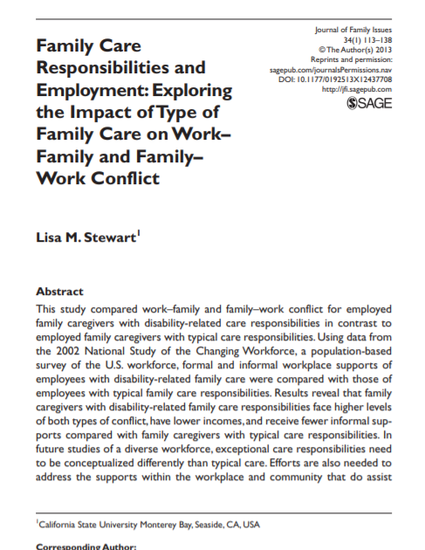
Article
Family Care Responsibilities and Employment: Exploring the Impact of Type of Family Care on Work–Family and Family–Work Conflict
Journal of Family Issues
(2013)
Abstract
This study compared work–family and family–work conflict for employed family caregivers with disability-related care responsibilities in contrast to employed family caregivers with typical care responsibilities. Using data from the 2002 National Study of the Changing Workforce, a population-based survey of the U.S. workforce, formal and informal workplace supports of employees with disability-related family care were compared with those of employees with typical family care responsibilities. Results reveal that family caregivers with disability-related family care responsibilities face higher levels of both types of conflict, have lower incomes, and receive fewer informal supports compared with family caregivers with typical care responsibilities. In future studies of a diverse workforce, exceptional care responsibilities need to be conceptualized differently than typical care. Efforts are also needed to address the supports within the workplace and community that do assist family caregivers with exceptional care responsibilities maintain their employment and manage their complex care.
Keywords
- disabilities,
- work–life integration,
- workplace support,
- work–family conflict,
- family–work conflict,
- social inclusion
Disciplines
Publication Date
2013
DOI
10.1177/0192513X12437708
Citation Information
Lisa M. Stewart. "Family Care Responsibilities and Employment: Exploring the Impact of Type of Family Care on Work–Family and Family–Work Conflict" Journal of Family Issues Vol. 34 Iss. 1 (2013) p. 113 - 138 Available at: http://works.bepress.com/lisa_stewart/4/
